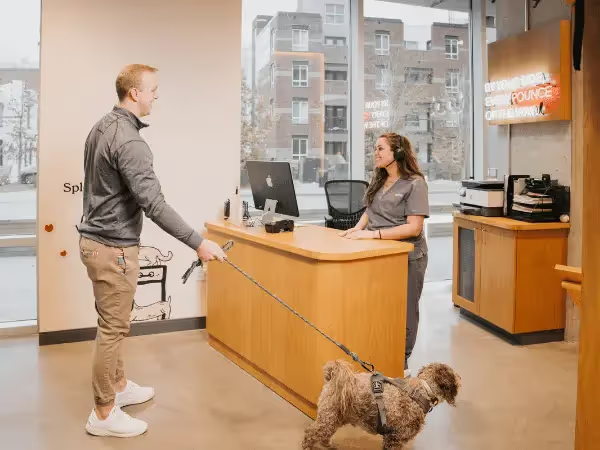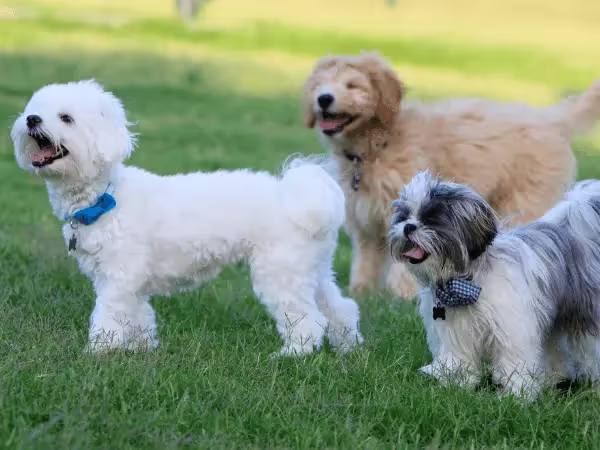Noticing your dog coughing, hacking, or making odd honking sounds? It could be kennel cough. Kennel cough in dogs is a contagious respiratory illness that affects dogs, often spreading quickly in places where pets are in close contact.
Kennel cough in dogs tends to be more common during colder months or in environments where many dogs gather, such as dog boarding facilities, daycare centers, or dog parks.
In this Sploot Vets guide, we talk about kennel cough in dogs, the signs and symptoms to look for, kennel cough treatment protocols, and when to best get the kennel cough vaccine.
I. What is Kennel Cough in Dogs [aka Bordetella]?
Kennel cough in dogs, also known as Bordetella or canine infectious tracheobronchitis, is most commonly caused by the following pathogens:
- Bacterial cause: Bordetella bronchiseptica
- Viral cause or contributor: Canine parainfluenza virus +/- canine adenovirus, canine distemper, canine influenza
1. Mode of Transmission: Kennel Cough in Dogs
Kennel cough or Bordetella in dogs is highly contagious and spreads through airborne droplets, shared water bowls, and direct contact. Because of this, it’s more prevalent in places where dogs interact closely, such as dog parks, kennels, grooming salons, and daycare centers
Note: Dogs that are frequently boarded or attend dog daycare should also be protected with the kennel cough vaccine for dogs.
2. Which Dogs Are Prone to Kennel Cough or Bordetella?
While any dog can contract kennel cough or Bordetella, some dogs are more susceptible to getting infected. These include unvaccinated dogs, puppies, senior dogs, and those with weakened immune systems.

II. Bordetella or Kennel Cough Symptoms in Dogs
Here are some kennel cough symptoms in dogs to watch out for. These signs of kennel cough in dogs usually appear within 2–10 days of exposure:
- Persistent, hacking cough – Caused by irritation and inflammation of the trachea and airways.
- Honking or gagging sound – A distinct symptom that sets kennel cough apart from normal coughing or barking.
- Runny nose – Nasal discharge results from respiratory irritation.
- Watery eyes – Often due to the body’s immune response to infection.
- Lethargy – Reduced energy as your dog’s body fights the illness.
- Loss of appetite – Some dogs may refuse food when they don’t feel well.
- Mild fever – Indicates the immune system is actively responding to infection.
1. What Does Kennel Cough In Dogs Sound Like?
Kennel cough in dogs often sounds like a loud, dry, honking, or hacking cough. Unlike the occasional throat-clearing cough or reverse sneeze, this cough is persistent and may cause your dog to gag or retch afterward.
Pet parents usually describe it as similar to a goose honk or as if their dog has “something stuck in their throat” that they are trying to get out.
2. Can Kennel Cough In Dogs Go Away By Itself?
Mild cases of kennel cough or Bordetella in dogs may resolve on their own within a couple of weeks. However, without supportive care or monitoring, the infection can worsen, especially in puppies, seniors, or dogs with health conditions.
It’s best to consult your vet to rule out more serious respiratory issues and ensure your pup receives proper treatment.
III. Kennel Cough Treatment [When to Call a Vet]
Kennel cough treatment usually involves supportive care, rest, hydration, and sometimes medications such as antibiotics (if a bacterial infection is present) or cough suppressants. Recovery typically takes 2–3 weeks.
Note: If you have other pets in the household, the veterinarian may also recommend separating your dog during treatment.
Additional Note: If kennel cough worsens, it can lead to pneumonia, causing fever, loss of appetite, and trouble breathing. Puppies, senior dogs, and dogs with weak immune systems are most at risk for these serious complications and should see a vet promptly when early symptoms arise.
IV. Prevention: The Kennel Cough Vaccine for Dogs [Bordetella Vaccine]
The kennel cough vaccine, also known as the Bordetella vaccine for dogs, is considered a “non-core” dog vaccine, meaning it isn’t required for every pet. However, it is highly recommended for dogs that are frequently brought to dog boarding establishments, attend dog daycare, or spend time at dog parks, since these environments increase the risk of exposure.
1. Is A Kennel Cough Vaccine Necessary?
Generally, yes, this vaccine is necessary. The kennel cough vaccine for dogs is highly recommended for (and may also be required by) dog parks, boarding facilities, training centers, or groomers. In any case, it’s important to protect dogs, especially those who regularly interact with other pets. When in doubt, consult your vet!
Note: The intranasal Bordetella vaccine is generally preferred and more effective—this is the option offered at Sploot Vets. Book your vet appointment today!
Additional Note: Because canine influenza (dog flu) and Bordetella can both cause respiratory illness in dogs, some pets may also benefit from the canine influenza vaccine, especially for dogs that frequent boarding facilities, doggy daycares, or dog parks.. Consult a vet to know the best options for your dog!
2. When is The Best Time to Get the Kennel Cough Vaccine or Bordetella Vaccine?
The best time to get the kennel cough vaccine for dogs is before any anticipated boarding, daycare visits, or travel. Puppies can begin the vaccine series as early 8 weeks old. Adult dogs should receive boosters as recommended by their veterinarian, typically every 6–12 months.
Final Thoughts on Kennel Cough in Dogs & Bordetella Vaccine
Kennel cough in dogs is common but manageable with prompt attention and preventive veterinary care. Recognizing the signs of kennel cough early, seeking veterinary guidance, and protecting your pup with the kennel cough vaccine are the best ways to keep your furry friend safe and healthy.
As an added note on prevention, Sploot Vets’ Medical Director Dr. Molly Wozniak states: “While the Bordetella vaccine can help prevent kennel cough, dogs that receive it may still contract the illness. However, in such cases, the vaccine can help lessen the severity of symptoms.”

Sploot Vets: Your All-in-One Vet for Preventives, Urgent Cases, & More
At Sploot Vets, we provide top-tier, all-in-one veterinary care, from primary care visits (e.g., getting the kennel cough vaccine) to urgent and emergency vet services for sudden health concerns. In addition, our Fear Free veterinary approach helps keep your dog calm and comfortable during visits.
With convenient locations in Denver, Chicago, and Colorado Springs, and vet clinics open 365 days a year with extended hours, we’re here whenever your pet needs us.
Book an appointment easily online or through the Sploot Vets app!






